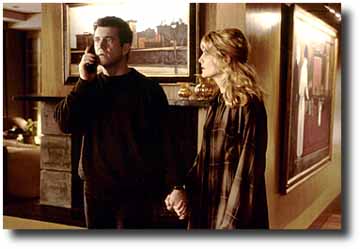
Mel Gibson and Rene Russo as Tom and Kate Mullen. (©1996 Touchstone Pictures. All Rights Reserved.)
|

Tom Mullen's need to stay in control lies at the heart of his character. He is indeed a control-freak who takes control over everything. He's never even told his wife about the bribe, and he doesn't consult her when he's deciding what to do about their son. It comes as no surprise that he refuses to play by the kidnappers' rules and insists they play by his instead.
By now you've seen the TV spots which give away one of the movie's great scenes. You know what I'm talking about: Tom Mullen sits in front of the TV camera with piles of money around him, telling the kidnappers, here's the ransom, but this is as close to it as you'll ever come. And it's a great scene indeed. (Complete with TV newscasters describing his statement afterwards--"It was very heartbreaking"--in the same way that they analyze political speeches!) But it's a great scene because this is when Mullen's obsession with control becomes clear. He could never relinquish control to the kidnappers and let them call the shots. This is a big time business executive who crawled to the top by paying off the union and now he won't pay off the kidnappers to get back his son. The audacity! In this scene the movie finally captures the arrogance of Mullen's character. He plays the kidnapping as a high-powered business deal when his son's life is at stake.
But unfortunately, the moviemakers then pull back and decide to play it safe. Instead of giving us a main character with a tarnished background whose insistence on staying in control threatens to destroy his family (this is potentially some great tragic material), the filmmakers continually key us that Mullen is right. That yes, this is what he has to do. The kidnappers keep talking about killing the boy, as if this is definitely part of their plans from the very start, and this exonerates Mullen's arrogance. And indeed endorses his behavior and leads the movie down a course where Mullen and Shaker must go mano a mano, that most overused of all Hollywood cliches. The movie actually gives us a brilliant, shocking, stunning ending filled with ambiguity and irony (reminiscent of Taxi Driver, while much more plausible), but then the movie lurches forward again, like Fatal Attraction where the movie can't just end; it has to make sure everyone is punished and the punishment must be dealt out by the star. You can practically envision the movie getting test screened with the audience writing on response cards things like "But I want to see Gibson kick some ass!" And for those viewers, the movie delivers. But the midsection of the movie is too damn good for the simplistic ending that it gets.
Ransom is a near miss, a movie that could have been great, with an Academy Award caliber performance from Gary Sinise. It'll probably clean up at the box office and further convince Hollywood that lead characters must always be reliable and that justice must always be dealt out in the final reel, preferably courtesy of the heroes fists. But I wish the filmmakers had set their sights a little higher and fully examined the complex character of Tom Mullen, instead of simply endorsing his control-is-good behavior and giving the audience little more than a thrill ride.
 A Touchstone Pictures Release
A Touchstone Pictures Release
|




